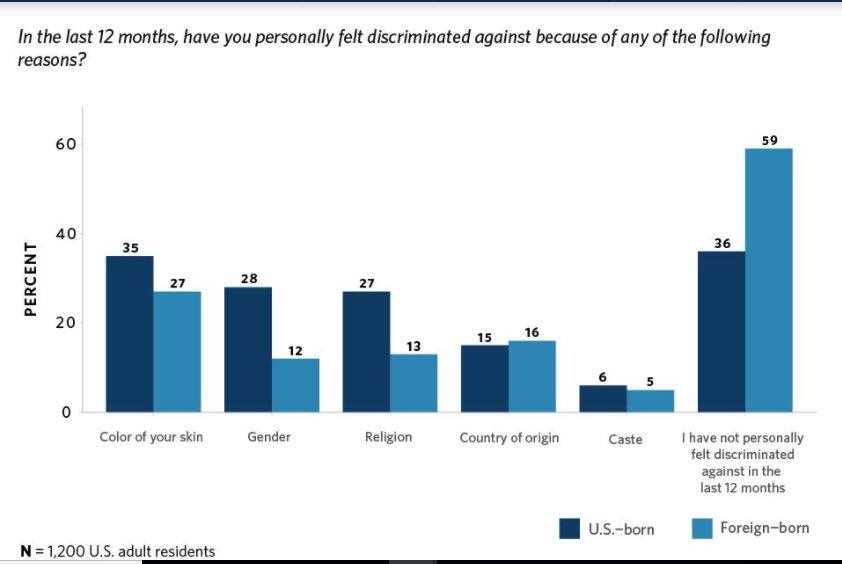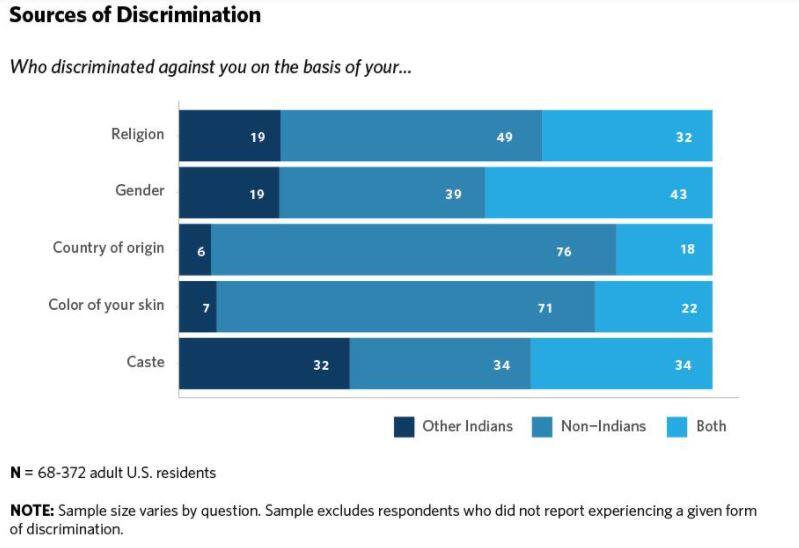One in two Indian Americans experienced some form of discrimination in the United States in the past one year and it is mostly over the colour of their skin, followed by gender, religion, country of origin, and caste, respectively, showed a new survey-based study.
The report, titled ‘Social Realities of Indian Americans: Results from the 2020 Indian American Attitudes Survey', draws on the Indian-American Attitudes Survey (IAAS) -- a collaboration between the Carnegie Endowment for International Peace, Johns Hopkins-SAIS, and the University of Pennsylvania, in partnership with the research and analytics firm YouGov. As per the report, US-born Indian Americans are more likely to complain of discrimination than their foreign-born counterparts, mostly in India.
“When it comes to discrimination experienced by Indian Americans, a significantly larger share of foreign-born Indian Americans (59 percent) state that they have not been discriminated against on any grounds in the past year, compared to just 36 percent of US-born Indian Americans,” said the report.
Experience with discrimination, by place of birth
 Source: 2020 Indian-American Attitudes Survey (IAAS)
Source: 2020 Indian-American Attitudes Survey (IAAS)
The study is based on a nationally representative online survey of 1,200 Indian-American residents in the US -- the 2020 IAAS -- conducted between September 1 and September 20, 2020, in the run-up to the US Presidential election when Donald Trump was the President.
The survey asked respondents about discrimination with relation to skin colour, gender, religion, and caste – beyond just country of origin.
“The data suggest that discrimination based on skin colour is the most common form of bias: 30 percent of respondents report feeling discriminated against due to the colour of their skin,” as per the survey report.
It further said, “An equal percentage of respondents—18 percent apiece—report that they have been discriminated against due to their gender or religion.”
There were 16 percent of respondents who said that they felt discriminated against due to the country of origin, while five percent for their caste, the survey showed.
 Source: 2020 Indian-American Attitudes Survey (IAAS)
Source: 2020 Indian-American Attitudes Survey (IAAS)
On the source of discrimination, respondents overwhelmingly blame non-Indians when it comes to country of origin or skin colour. In both instances of discrimination, around three-quarters of perpetrators were identified as non-Indians.
According to the report, Indian-Americans exhibit very high rates of marriage within their community. While eight out of 10 respondents have a spouse or partner of Indian-origin, US-born Indian-Americans are four times more likely to have a spouse or partner who is of Indian-origin but was born in the United States.
The survey found that religion plays a central role in the lives of Indian-Americans but religious practice varies. While nearly three-quarters of Indian-Americans state that religion plays an important role in their lives, religious practice is less pronounced.
Forty percent of respondents pray at least once a day and 27 percent attend religious services at least once a week. The report notes that roughly half of all Hindu Indian-Americans identify with a caste group. Foreign-born respondents are significantly more likely than US-born respondents to espouse a caste identity. The overwhelming majority of Hindus with a caste identity -- more than eight in 10 -- self-identify as belonging to the category of General or upper caste.
(With inputs from PTI)